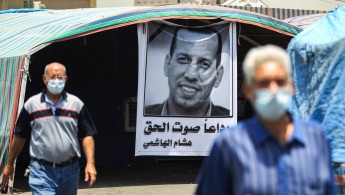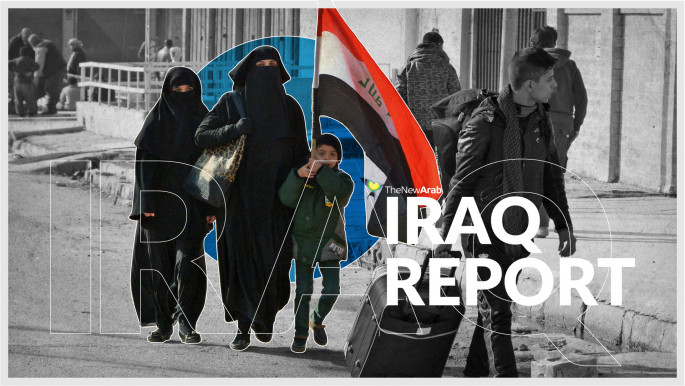The Iraq Report: Hisham al-Hashimi's killing sends a grim message to opponents of Shia militias
Iraq watchers around the world were stunned this week when a well-known and widely respected researcher and adviser on Iraqi militant groups was killed on Monday night.
Hisham al-Hashimi – who was an expert on both Sunni and Shia jihadist groups including the Islamic State and Iran-backed groups – was shot dead by an unidentified gunman outside his home in eastern Baghdad.
Hashimi's slaying sparked an outpouring of grief from both international journalists, researchers, and academics, as well as domestically within Iraq from people who perceived his death to be the latest manifestation of how powerful the Shia militias, widely suspected to be his killers, had become.
His death has also been seen as a message to Prime Minister Mustafa al-Kadhimi and to the United States that Iraq belongs to the Iran-backed militias.
While Kadhimi has called for an investigation, his political weakness and increasingly obvious lack of authority will likely mean that whoever ordered the assassination will escape justice.
The many sides of Hisham al-Hashimi
Hisham al-Hashimi – formerly known as Hisham al-Rikabi – was born in Baghdad to a Shia Arab family in 1973. Although he was too young to have served in the Iraqi military during its eight-year war against neighbouring Iran, it is likely that Saddam Hussein's so-called "faith campaign" of the early nineties greatly impacted him as he converted to Sunnism.
 |
Hashimi's slaying sparked an outpouring of grief from both international journalists, researchers, and academics, as well as domestically within Iraq |  |
The faith campaign was an attempt by the Baathist regime to provide an Iraqi state-approved version of Islamic religiosity to counter Iran's Khomeinist Shia Islamist trend. Although it was designed to provide a religious outlet for the public that aligned with the state, Hashimi subsequently became involved with the Salafist trend.
Hashimi's connection with fundamentalist Salafism led him to being incarcerated by the Baathist regime in 1997 and he was only released from prison in 2002, a year before the US-led invasion of 2003 that would greatly influence the next phase of his life.
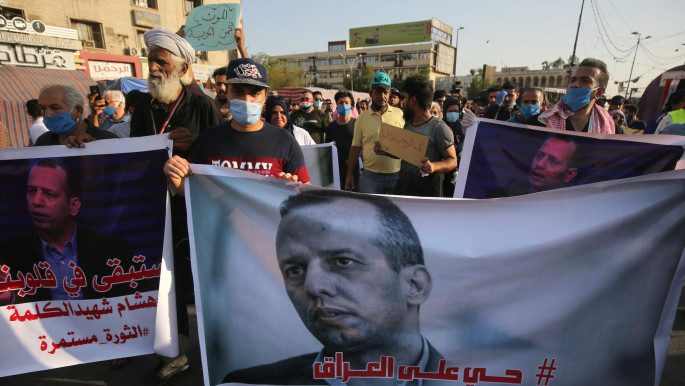 |
|
| Read more: Iraqi researcher on militant groups Hisham al-Hashimi killed |
His knowledge of the tenets of radical Salafism put him in good stead to become a religious teacher, and Hashimi subsequently became involved with anti-American armed Islamists Iraqi factions who fought an insurgency against US-led coalition troops, in particular the Islamic Army in Iraq, a group that disbanded in 2011.
His stint as an ideological and religious teacher actually put him into contact with Ibrahim Awwad al-Samarrai, a man who would later become better known as the Islamic State's "caliph", Abu Bakr al-Baghdadi. Baghdadi attended Hashimi's religious lessons before Hashimi turned his back on armed Salafism and began to offer his intimate knowledge of these armed factions to the Iraqi government.
This move was seen as a betrayal, and Hashimi subsequently started receiving threats from a variety of factions, including Al-Qaeda in Iraq, the precursor to IS.
However, and undeterred, Hashimi continued to provide counsel and advice to the Iraqi authorities as well as to the United States government and other Western powers involved in Iraq. Hashimi also provided direct counsel to both Turkish President Recep Tayyip Erdogan and Saudi Arabian Crown Prince Mohammed bin Salman.
He was also regularly sought out by international journalists and academics who were interested in covering Iraq, many of whom took to social media to decry his assassination when the news first broke on Monday night.
 |
Hashimi's criticisms of powerful pro-Iran groups like Kataib Hezbollah led to him receiving numerous death threats in the weeks preceding his assassination |  |
Among them was British expert on Iraq Professor Toby Dodge of the London School of Economics (LSE). In a blog post mourning his recently slain colleague and friend, Dodge directly blamed the "ungoverned militias" for Hashimi's murder.
Hashimi used his political standing and academic clout to engage as a public-facing expert to appear across various media outlets, including domestic Iraqi media. He was known to have recently offered support to the Iraqi protest movement that began in October last year and had repeatedly written about and criticised the Iran-backed militias who he believed exercised a lot of influence over Iraq's domestic and foreign policy.
Hashimi's criticisms of powerful pro-Iran groups like Kataib Hezbollah led to him receiving numerous death threats in the weeks preceding his assassination. Hashimi even approached a friend, Ghaith al-Tamimi, and asked for his advice on how to deal with the death threats mere hours before he was gunned down outside his home in Zayouna, eastern Baghdad.
A message to Kadhimi
Following Hashimi's murder, Prime Minister Mustafa al-Kadhimi pledged to bring his killers to justice and said that he had ordered the interior ministry to conduct a full investigation. Kadhimi also visited the slain expert's home to pay his respects to Hashimi's family, describing him as a "hero".
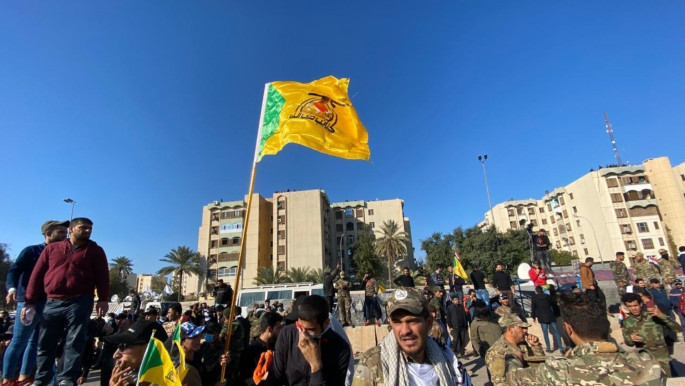 |
|
| Read more: The Iraq Report: Pro-Iran militias reassert dominance over Mustafa al-Kadhimi |
Yet it would appear increasingly clear that, despite his best intentions, Kadhimi is almost completely powerless to bring Hashimi's assassins to justice and he has not even suggested who he believes may be responsible for the killing.
Although IS-linked social media feeds were gleeful at Hashimi's death, it is highly unlikely the Sunni militants were responsible.
While IS have been known to use gunmen to kill their targets in Mosul and other cities where they previously had a commanding presence, attacks in the capital tend to follow a pattern of explosive devices being smuggled in before being detonated either remotely or via a suicide bomber, as in the 2016 Karrada bombing in central Baghdad.
Moving guns and militants into Baghdad will require would-be attackers to bypass a veritable maze of militia and federal police-controlled checkpoints, which makes gun attacks in the capital by IS increasingly difficult and rare.
 |
His murder is now clearly being seen as a message that anyone who criticises the status quo or attempts to undermine pro-Iran Shia militias faces the risk of death |  |
However, no such difficulty is faced by the pro-Iran militants who freely move through Baghdad fully armed without any hindrance.
While Kataib Hezbollah denied any link to the assassination, it was not long ago that they drove 150 armed men directly into the heavily fortified Green Zone and made a show of force outside the prime minister's official residence. No military or federal police units impeded their entry or stood up to them when they threatened the nation's top politician.
Since Hashimi's assassination, Kataib Hezbollah has again warned Kadhimi that any actions he takes against the pro-Iran militias will lead to "escalation". To that end, Kadhimi's instructions to the interior ministry to investigate the assassination seem to fall flat.
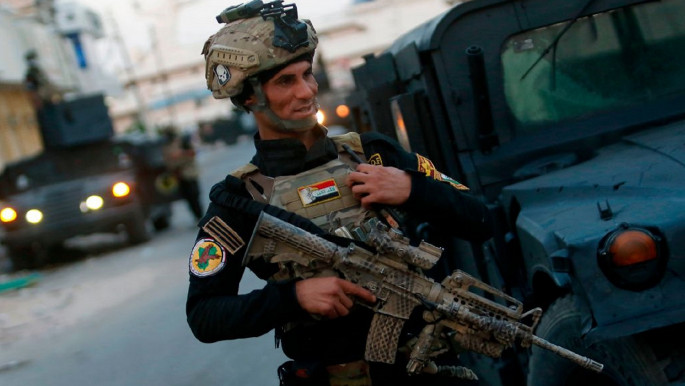 |
|
| The Iraq Report: Showdown with Iran-backed militias in Baghdad tests Mustafa al-Kadhimi's government |
The Iraqi interior ministry is well-known as a hub of pro-Iran Shia militia activity and has been controlled by the Tehran-linked Badr Organisation for most of the time since the United States toppled Saddam Hussein's Baathist dictatorship in 2003.
This would therefore be opening any investigation to the criticism of lacking impartiality, as it would be akin to asking those suspected of being involved in Hashimi's murder to solve a crime they could easily be intimately connected to.
Many of these militias also serve under the umbrella of the Popular Mobilisation Forces (PMF) that, while technically a part of Iraq's armed forces, have close and enduring links to the chain of command within Iran's Islamic Revolutionary Guard Corps (IRGC).
This includes militias tied to the interior ministry as well as Kataib Hezbollah and similar armed outfits who are represented by the Conquest Coalition and the Binaa Bloc in parliament. Kadhimi will not be able to overrule these blocs as he is reliant upon their confidence to remain in office as he lacks a popular mandate to govern by winning elections.
This all spells for a troubling new chapter in Iraq's post-invasion story, as we are now seeing a return to targeted and political assassinations.
 |
With Hisham al-Hashimi's assassination, a message of intolerance has been sent |  |
Despite his publicly aired misgivings about the government, Hashimi was very much a part of the political status quo. Many believed that his reach and connections to the government, the militias, and even armed insurgent groups would have provided him with a level of protection that would render him almost untouchable.
However, his murder is now clearly being seen as a message that anyone who criticises the status quo or attempts to undermine the pro-Iran Shia militias' subversion of the political process faces the risk of death.
Other Iraqi experts living abroad have also commented about how they and their families have been threatened with death which demonstrates that the problem is not isolated within Iraq's borders but has potential global reach, silencing dissidents and opposition voices.
With Hashimi's assassination, a message of intolerance has been sent. It is now the responsibility of the international community, primarily the United States, as well as the Iraqi authorities to return a message that the rule of law will be respected, and freedom of expression and political opinion will be guaranteed.
